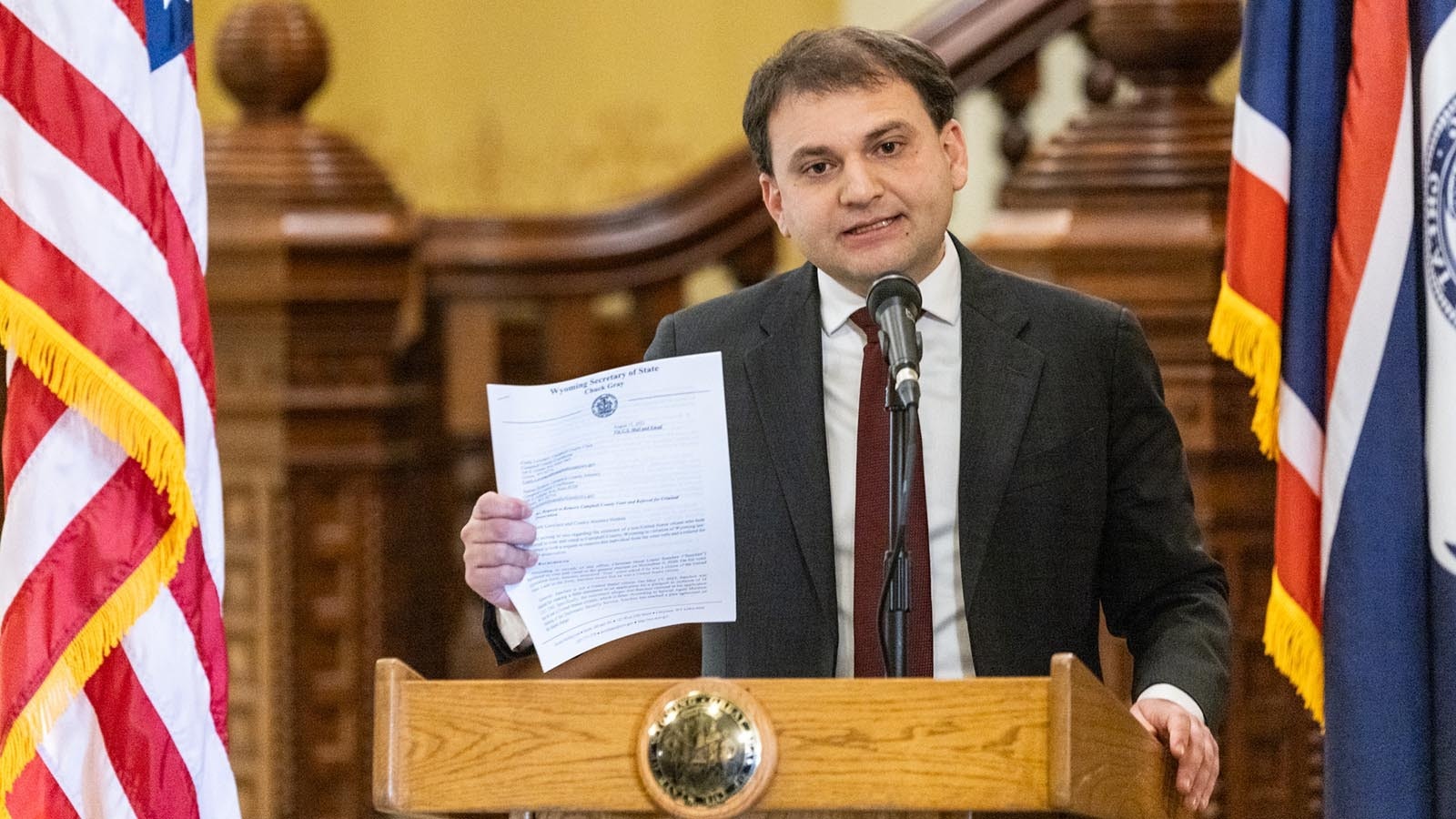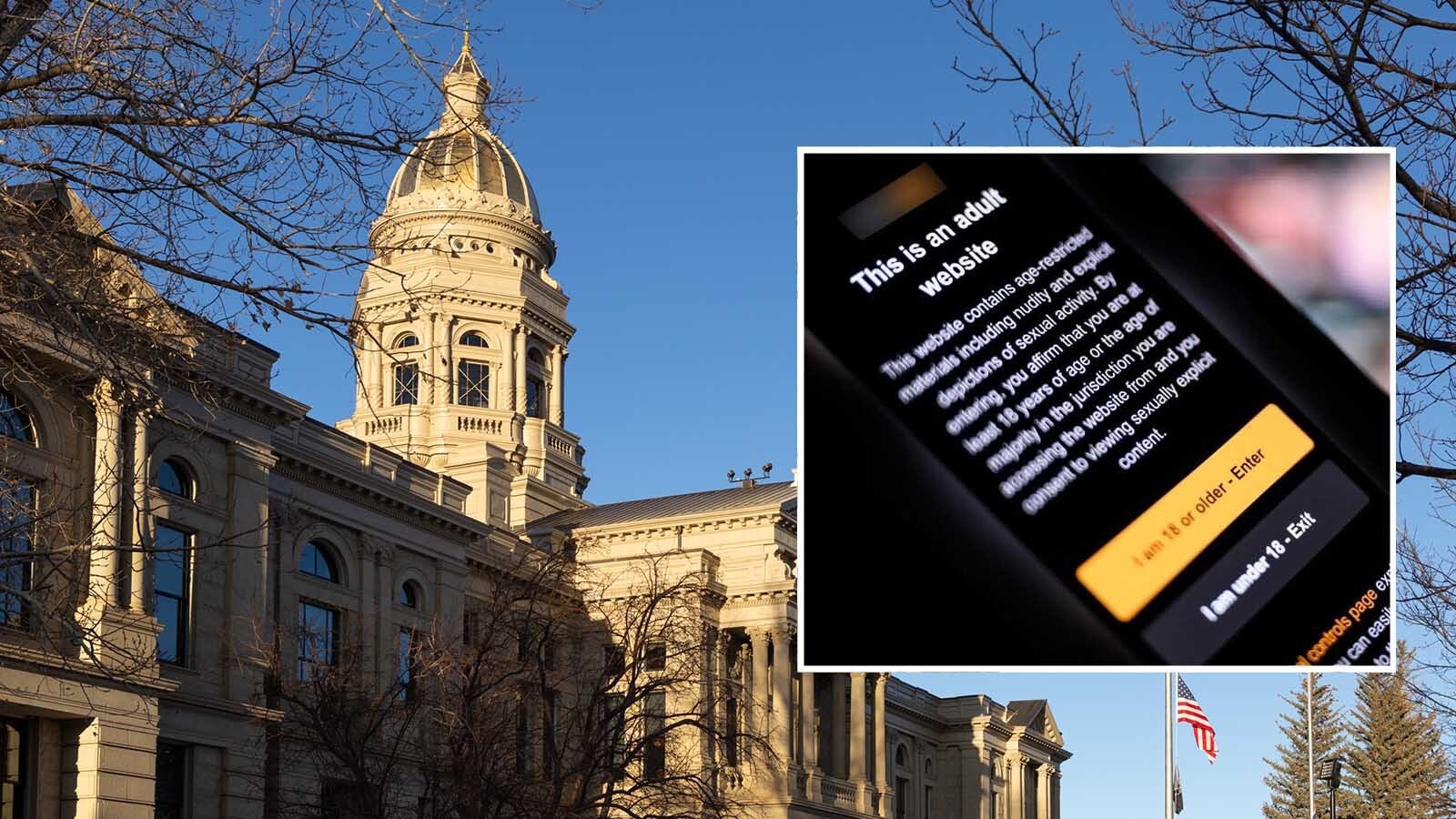Wyoming’s prosecutors did not deprive a Kansas City man of a fair trial for attempted murder after the man shot at Wyoming State Troopers during an icy 2021 car chase through the prairie outside Rawlins, the Wyoming Supreme Court has ruled.
Jett Garriott Adams, 24, fled Kansas City, Missouri, in February 2021 after the justice system called him to face a possible probation revocation, but he decided to skip court instead, says a Thursday ruling in which the Wyoming Supreme Court upheld the attempted murder conviction that sent Adams to prison for life without parole in 2022.
So Adams bought a gun and plotted to shoot Kansas City police, the prosecutor and the judge on his case, says the high court’s ruling. But a friend persuaded him to leave Missouri instead.
Adams cut off his GPS monitor and drove to Idaho to start a new life, get a job and “lay low,” says the ruling.
Adams’ appeal brief elaborates, saying he wanted to reunite with his biological mother, avoid registering as a sex offender as required and maybe find a relationship.
That’s Icy
While driving across Interstate 80 outside of Rawlins on Feb. 19, 2021, Adams exceeded the posted 65 mph speed limit set on the variable speed zone for the icy roads.
Wyoming Highway Patrol Trooper Hobbs watched Adams speeding and pulled him over, asking for his license, registration and insurance.
Adams’ insurance had just expired, says his appeal, and he couldn’t produce it.
Hobbs asked Adams to come to Hobbs’ patrol vehicle, but Adams sped away instead. He wanted to “just get away,” says his appeal.
Hobbs chased Adams until Adams pulled over a second time. This time Hobbs treated the encounter as a felony stop and drew his pistol.
Adams exited his driver’s-side door with his own gun drawn. The silhouette of Adams’ handgun, his appeal claims, prompted Hobbs to start shooting.
Adams ducked into his own vehicle while shooting back.
Hobbs crouched behind his own open driver’s side door for cover. Shrapnel cut his forehead, but neither man was shot.
Both men emptied their clips, riddling each other’s vehicles with bullets but not disabling them.
Adams got back into his vehicle and sped away.
Through The Wyoming Prairie
A Carbon County Sheriff’s Office deputy and another trooper joined Hobbs in the chase, accelerating to above 100 miles per hour, swerving and using the emergency lane to dodge other vehicles and semitruck traffic, says the ruling.
Adams kept shooting at Hobbs through his own back windshield during the chase, firing at least 28 times.
“Adams took the pursuit into the prairie hoping that he could get away from Trooper Hobbs,” says Adams’ appeal.
He darted off the interstate and through a fence. But his car couldn’t tackle the winter snow and prairie terrain, and it stopped working, the ruling adds. So Adams abandoned his car, but left his gun in it.
As evening approached, law enforcement agents kept up the chase in the deputy’s four-wheel-drive vehicle.
Adams surrendered when the agents caught up to him. Trooper Bracken arrested Adams.
Let’s Check Your Mind First
Adams pleaded not guilty to 10 charges, including attempted first-degree murder, on June 25, 2021. Two weeks later, his defense attorney asked the court to pause the case so mental-health experts could evaluate Adams.
Carbon County District Court Judge Dawnessa Snyder ordered two tests from two different doctors.
Dr. Paul Murdock was to determine whether Adams was mentally fit to continue his case, or whether the state would need to restore Adams before proceeding.
Dr. Renee Wilkinson was to determine whether Adams was so mentally ill at the time of his crime that he couldn’t tell right from wrong.
Murdock concluded that Adams could face prosecution.
Wilkinson diagnosed Adams with depression, anxiety and borderline personality disorder but said that he could still tell right from wrong and could conform his actions to the law when he shot at a Wyoming trooper.
‘I Can End This And Get Away’
Adams asked Snyder to hold a bench trial; that is, a trial in which a judge decides the case rather than a jury. It took a while, but prosecutors eventually agreed and the court held a bench trial March 23, 2022.
Adams’ defense counsel tried to prove to the judge that Adams was mentally ill during the shooting.
Prosecutors and defense both questioned Wilkins and Murdock.
Adams also testified about his rough upbringing in foster homes and the abuse and neglect he endured as a child, says the ruling.
“Did he ever tell you he misunderstood what was happening?” asked the prosecutor of Murdock, when recounting Adams’ account of the shootout.
“No,” answered Murdock. “In fact, he told me that, ‘If I shoot him, I can end this and get away.’”
“And never during the discussions with him did he disclose anything about having episodes of disassociation?” asked the prosecutor.
“No,” Murdock said. “Nor did I observe that rationale or explanation anywhere in the police report.”
Because, The Fifth Amendment
Prosecutors must be careful when asking evaluators questions about defendants’ mental health to not to ask questions about guilt.
Every defendant has a right against incriminating himself. If he says self-incriminating things during a mental health evaluation ahead of his trial, prosecutors have to avoid airing those statements as evidence, the ruling says.
But in this case, the high court ruled, the prosecutor didn’t show signs of knowingly violating Adams’ right.
That’s because it was the defense attorney who, while cross-examining Murdock about Adams’ mental health, solicited information about whether Adams had flashbacks and dissociative disorders from post-traumatic stress disorder.
The prosecutor during redirect questioning asked Murdock questions along the same line to counter the topic the defender already had raised, the ruling says.
During that line of yes-or-no questioning, Murdock ventured Adams’ statement about ending the conflict voluntarily, not in response to a direct inquiry.
So the high court decided that the prosecutor didn’t commit misconduct during that questioning. But the court took it a step further, noting that Adams relayed “the same self-incriminating statements about his intent in his own testimony,” and that even if the prosecutor had broken the rules by engaging Murdock in that way, Murdock’s answer didn’t cause Adams’ conviction.
Rough Childhood
Adams also challenged how the prosecutors handled Dr. Wilkinson’s testimony.
She answered questions about Adams’ difficult childhood, his spotty education and stretches of being homeless.
Wyoming law dictates that information gotten during evaluations weighing defendants’ mental health during their crimes should be used in court only to discuss their mental health, not for any other reason.
But Wilkinson did not give any self-incriminating statements from her interviews with Adams, the high court decided, so prosecutors did not break the rules.
“The State did not offer, and the court did not admit, Dr. Wilkinson’s testimony on any issue other than that of Mr. Adams’s mental condition,” reads the ruling. “Mr. Adams’s own trial testimony and his counsel’s cross-examination of Dr. Wilkinson elicited more information about Mr. Adams’s childhood traumas and his background than that which he complains of on appeal.”
If testimony of Adams’ background did deprive him of a shot at a fair trial, the document continues, that was because of Adams’ own testimony, not prosecutors’ questions.
Clair McFarland can be reached at clair@cowboystatedaily.com.





